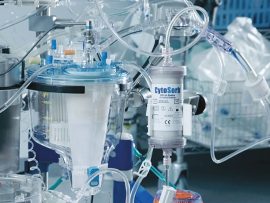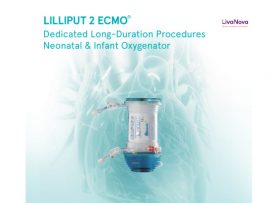Abstract BACKGROUND The use of extracorporeal life support (ECLS) in the trauma population remains controversial and has been reported only in small cohort studies. Recent ECLS technical advances have increased..
Read MoreAbstract The use of extracorporeal life support (ECLS) throughout the perioperative phase of lung transplantation requires nuanced planning and execution by an integrated team of multidisciplinary experts. To date, no..
Read MoreAbstract Background The use of extracorporeal life support (ECLS) has expanded to include unique populations such as peripartum women. This systematic review aims to (1) quantify the number of cases..
Read MoreAbstract Extracorporeal Life Support (ECLS), including venovenous (VV) extracorporeal membrane oxygenation (ECMO) and extracorporeal carbon dioxide removal (ECCO2R) is a temporary support option for patients with severe respiratory failure. Current..
Read MoreAbstract Background Mixed cardiogenic and septic shock has been shown to have a higher mortality than cardiogenic shock alone and presents a unique hemodynamic phenotype. Objectives This study aimed to..
Read MoreAbstract Extracorporeal life support (ECLS) requires specialized cannulas for vascular access that are dependent on each patient’s needs, size, and unique vascular anatomy. There are currently no commercially available drainage..
Read MoreAbstract Introduction Current guidelines advise that anaphylactic shock refractory to traditional treatments may be managed with extracorporeal life support (ECLS), but reports have been exclusive to adults. Case Report We..
Read MoreAbstract Background Outcomes in cardiac surgery are influenced by surgical priority, with higher mortality in emergency cases. Whether this applies to postcardiotomy venoarterial (VA) extracorporeal membrane oxygenation (ECMO) remains unknown...
Read MoreAbstract Cannula-associated deep vein thrombosis (CaDVT) following decannulation from extracorporeal life support (ECLS) is a commonly reported complication with several associated risk factors. This study investigated the incidence and risk..
Read MoreAbstract Extracorporeal life support (ECLS) has become increasingly common in the United States to manage refractory cardiopulmonary failure and has been used in complex populations including pregnant women. Application of..
Read MoreAbstract Introduction No clear guidelines exist for unfractionated heparin (UFH) monitoring in adult patients on veno-arterial extracorporeal life support (VA-ECLS) for refractory cardiogenic shock. In this study, we sought to..
Read MoreAbstract Background While left ventricular (LV) venting reduces LV distension in cardiogenic shock patients on venoarterial extracorporeal membrane oxygenation (VA-ECMO), it may also amplify risk of acute brain injury (ABI). We..
Read MoreAbstract Aim of the study Predictive factors for poor outcomes in hypothermic cardiac arrest (HCA) differ from those in normothermic out-of-hospital cardiac arrest (OHCA). This study aimed to evaluate the..
Read MoreAbstract Background: Acute right ventricular failure is a critical complication after left ventricular assist device (LVAD) implantation, often managed with a temporary paracorporeal right ventricular assist device (RVAD). This study..
Read MorePresented by: Timothy M. Maul, CCP, FPP, PhD The Hoosier Extracorporeal Science Conference (HESC) is hosted and managed by Heartbeat Perfusion Solutions Inc. The video content has been made available..
Read MoreAbstract ExtraCorporeal Liver Support (ECLS) systems were developed with the aim of supporting the liver in its detoxification function by clearing the blood from hepatic toxic molecules. We conducted a..
Read MoreAbstract Despite immediate coronary revascularization, mortality of patients experiencing infarct-related cardiogenic shock (AMICS) remains high [1]. Over the past decade, there has been a growing interest in the use of..
Read MoreAbstract BACKGROUND Extracorporeal life support (ECLS) is increasingly used in the treatment of infarct-related cardiogenic shock despite a lack of evidence regarding its effect on mortality. METHODS In this multicenter..
Read MoreAbstract Background In the field of extracorporeal life support (ECLS), the rapid influx of novel technologies and innovative techniques presents an ongoing challenge for professionals to stay informed about these..
Read MoreAbstract Background and Objective: Resuscitative therapies for respiratory and cardiac failure are lifesaving and extended by using extracorporeal life support (ECLS) as mechanical circulatory support (MSC). This review informs the debate..
Read MoreAbstract Background: The use of simultaneous veno-arterial extracorporeal membrane oxygenation (ECMO) with or without an Intra-Aortic Balloon Pump (IABP) is a widely used tool for mechanical hemodynamic support. Endothelial function,..
Read MoreAbstract Introduction A cross-sectional survey GENERATE (GEospatial aNalysis of ExtRacorporeal membrane oxygenATion in Europe) initiated on behalf of the European chapter of the Extracorporeal Life Support Organization (EuroELSO), aims to..
Read MoreSurvival and Factors Associated with Survival with Extracorporeal Life Support During Cardiac Arrest
Abstract The survival rate after cardiac arrest (CA) remains low. The utilization of extracorporeal life support is proposed to improve management. However, this resource-intensive tool is associated with complications and..
Read MoreAbstract OBJECTIVES Implanting a durable left ventricular assist device (LVAD) in a patient on extracorporeal life support (ECLS) is challenging. The goal of this study was to compare..
Read MoreAbstract Background: The use of extracorporeal membrane oxygenation (ECMO) in coronavirus disease 2019 (COVID-19) for refractory respiratory failure, severe cardiac dysfunction, and bridge to lung transplantation has been steadily increasing..
Read MoreAbstract Accidental hypothermia (AH) in Mediterranean countries often is underestimated. AH should be suspected in patients also in moderate climates throughout all seasons. Compared with other countries, the mortality rate..
Read MoreContext Poisoning may lead to respiratory failure, shock, cardiac arrest, or death. Extracorporeal membrane oxygenation (ECMO) may be used to provide circulatory support, termed venoarterial (VA) ECMO; or respiratory support..
Read MoreAbstract Objective: The aim was to evaluate the performance of a newly developed magnetically suspended centrifugal pump head intended for use as a ventricular assistance device with a newly developed..
Read MoreAbstract Extra Corporeal membrane oxygenation (ECMO) is one of the most advanced forms of life support therapy in the Intensive Care Unit. It relies on the principle where an external..
Read MoreAbstract Low cardiac output syndrome and the systemic inflammatory response are consequences of the cardiac surgical perioperative course. The mechanisms responsible are multifactorial, but recent studies have shown that nitric..
Read More
















